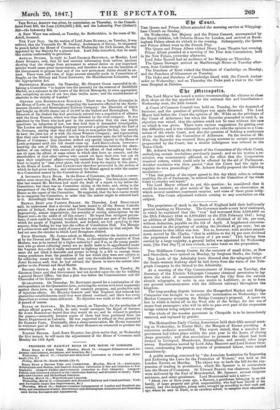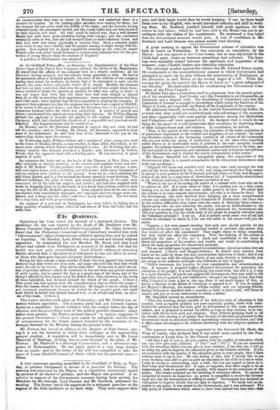Zbe IFIEtropolts.
The Lord Mayor has issued a notice recommending the citizens to doge their shops on the day appointed for the national fast and humiliation= Wednesday next, the 24th instant.
A Court of Common Council was held on Tuesday, for the despatch of business; and the question of privileges was again discussed. The Lord Mayor laid before the Court the opinion of Mr. Wilde on the privileges of the Court of Aldermen; but when the Recorder proceeded to read it, an objection was raised, that the opinion could not be read without the case on which it was given. There were various suggestions for getting over this difficulty; and it was ultimately resolved to refer the opinion to a Com- mittee of the whole Court, and also the question of holding a conference on the matter with the Committee of Aldermen. On the motion of Mr. Wire, the Recorder was excused from giving answers to certain questions propounded by the Court; but a similar indulgence was refused to the Town-Clerk.
Mr. Ashurst brought up the report of the Committee of the whole Court, embodying certain resolutions previously passed; and on his motion a re- solution was unanimously affirmed, to the effect that the Corporation required reform, which could only be effected by the aid of Parliament. Another resolution was then passed, "that the Court had the right to regulate its own proceedings." Mr. Ashurst finally proposed the following resolution-
" That that portion of the report agreed to this day which refers to reforms requiring the aid of Parliament, be referred back to the Committee of the whole Court to consider and report"
The Lord Mayor refused to put this question: he considered that it would be necessary to give notice of the last motion; an observation at which several members expressed surprise, and some of them great indig- nation. The Court adjourned without coming to any conclusion on the subject.
The proprietors of stock in the Bank of England held their half-yearly general meeting on Thursday. The Governor made every brief statement, in which he explained that the " rest " had increased from 3,689,4301. on the 28th February 1846 to 3,899,2221. on the 27th February 1847; being an addition of 299,7921. He announced a dividend of 31. 10a. per cent, without deduction, payable on the 5th of April. A lengthened conversa- tion ensued on the propriety of making the dividend 41. per cent; but an amendment to that effect was lost. Not so, however, with another amend- ment, moved by Mr. Clarke, " that in addition to the 3} per cent dividend the proprietors should have a bonus of 1 per cent." This having been carried by a large majority, a general ballot was appointed for Wednesday next, [the Fast Day?] at two o'clock, to take votes on the proposition.
Two Middlesex County Courts for the recovery of small debts, at Bow and Shoreditch, were opened on Monday, by Sergeant Storks, the Judge.
The Lords of the Admiralty have directed that the telegraph-wires of the South-western Railway shall be laid down from the wires of the Tele- graph Company in the Strand to the Admiralty.
At a meeting of the City Commissioners of Sewers, on Tuesday, the Secretary of the Electric Telegraph Company obtained permission to lay down the wires of communication through the City from the various electric telegraphs, to unite in one centre in Lothbury, so as to form one general communication with the different railways throughout the kingdom.
The long-pending dispute between the Hungerford Market and Bridge Companies was brought to an amicable termination on Wednesday; the Market Company accepting the Bridge Company's proposal. A space six feet in width is railed off on the West side of the bridge, for the use of steam-boat passengers; who will be able to pass over part of the suspension bridge without being subject to any charge.
The whole of the wooden pavement in Cheapside is to be immediately removed, and replaced by granite.
The Metropolitan Early Closing Association held their fifth annual meet- ing on Wednesday, in Exeter Hall; the Marquis of Exeter presiding. A numerous audience assembled. The report stated, that a manifest im- provement had taken place within the past year in the hours of closing shops generally; and that associations to promote the object had been formed in Liverpool, Manchester, Birmingham, and several other large towns. Resolutions moved by Lord John Manners and Lord Robert Gros- venor, condemning the present system of protracted labour, were carried unanimously.
A public meeting, convened by " the Associate Institution for Improving and Enforcing the Laws for the Protection of Women," was held at the London Tavern on Monday. The object was to back the bill for the sup- pression of trading in prostitution, which Mr. Spooner is to reintroduce into the House of Commons. Sir Edward Buxton was chairman. Speeches were delivered by the Earl of Mountcashel, Mr. Spooner, several religions ministers, and other gentlemen. Lord Mountcashel told a tale— "About two or three years ago, a Baronet, a gentleman belonging to an old family, of large property and great respectability, who had been Sheriff of his county, had two daughters, young ladies brought up according to their rank and age, whom he sent to Paris, to an excellent school, to complete their education.
At vacation-time they were to return by Boulogne, and embarked there in a steamer for London. At the landing place servants were waiting for them; but the steamer did not arrive until the middle of the night; and the servants having returned home, the passengers landed, and the young ladies had not been heard of by their families ever since. All that could be learned was, that a well-dressed female had paid them great attention during their voyage; and the conclusion eventually come to was, that she had decoyed them to some infamous house, and that they were now either physically or morally dead. Such a calamity might come home to any man's family, and the parties causing it might escape with im- panity. In a country not so much vaunted for morality as our own—he meant France—the code penal would be found to contain more salutary laws for the pro- tection of young females than the statutes of England." A petition to Parliament was adopted.
M the Guildhall Policmoffice, on Saturday, the Superintendent of the Fleet Street depot of the Parcel Post Company solicited the advice of the Magistrates. He stated that the affairs of the company were in a chaotic condition; all the Directors having resigned, and the concern being generally in debt. He had in his possession about a thousand parcels; but some of the vehicles of the company having been seized by creditors, lie feared that if he attempted to send out the panels, the carts, horses, and ioods, would all be seized. Besides, the business had been so laxly conducted, that even the guards and drivers might think them- selves entitled to detain the parcels as security for what was owing to them : it was not wages that were due, but these men had been obliged to deposit teem 51. to 101. on receiving their appointments; seven superintendents bad thus paid 1401. each; these deposits had all been expended in starting the company. It appeared from a prospectus, that the company was to have had a capital of 30,0001., to be raised in five-pound shares; and that the Directors were to be authorized to commence business before the whole was subscribed. A number of guards and drivers corroborated the statement respecting their deposits. Sir William Maguey advised the applicant to transfer the parcels to the original Parcels Dehvery Company, which had obtained the character of a responsible and punctual estab- fiehment. The Superintendent said he would do so. On Monday, one of the Directors attended to explain why and when he had left the company; and on Tuesday, Mr. Gough, the Secretary, appeared to deny seine of the statements : he said that four of the Directors would pay all the outstanding claims upon the concern.
On Wednesday night, William Gobert and a number of other young men went to the house of Thomas Brooks, a cane-worker, in Hare Alley, Shoreditch, to de- mand some articles which Gobert said belonged to him. An ill-feeling had pre- viously existed; this demand provoked a dispute; and, threatened by Gobert, Brooks shot his opponent dead with a fowling-piece. He was arrested, in great anguish of mind.
An extensive fire broke out on the banks of the Thames, at Nine Elms, soon after midnight on Sunday morning, at the creosote and naphtha works and saw- mills of Mr. BethelL On the premises were reservoirs of pitch and tar, a saw- mill and engine-house, and a rectifying and still-house; while many thousands of railway-sleepers were stacked on the ground. Some tar in a shed adjoining the still-house ignited, and in a few minutes the flames spread in every direction. The different buildings, the piles of wood, and nearly everything in the yard, were consumed; for by the time the engines had arrived, and had been supplied with water by dragging them on to the beach, it was found that nothing could he done to stay the fire on Mr. Bethell's premises. Some adjacent lime-works and a tim- ber-dealer's were considerably damaged; two tug-boats and two barges were con- sumed, and a barge and two other craft were nearly destroyed. The fire burnt for a long time, and with great vividness.
An engineer of a saw-mill at Paddington has been killed, by falling into a =LucI:thy of scalding water, which he had drawn off from the boiler into the



























 Previous page
Previous page